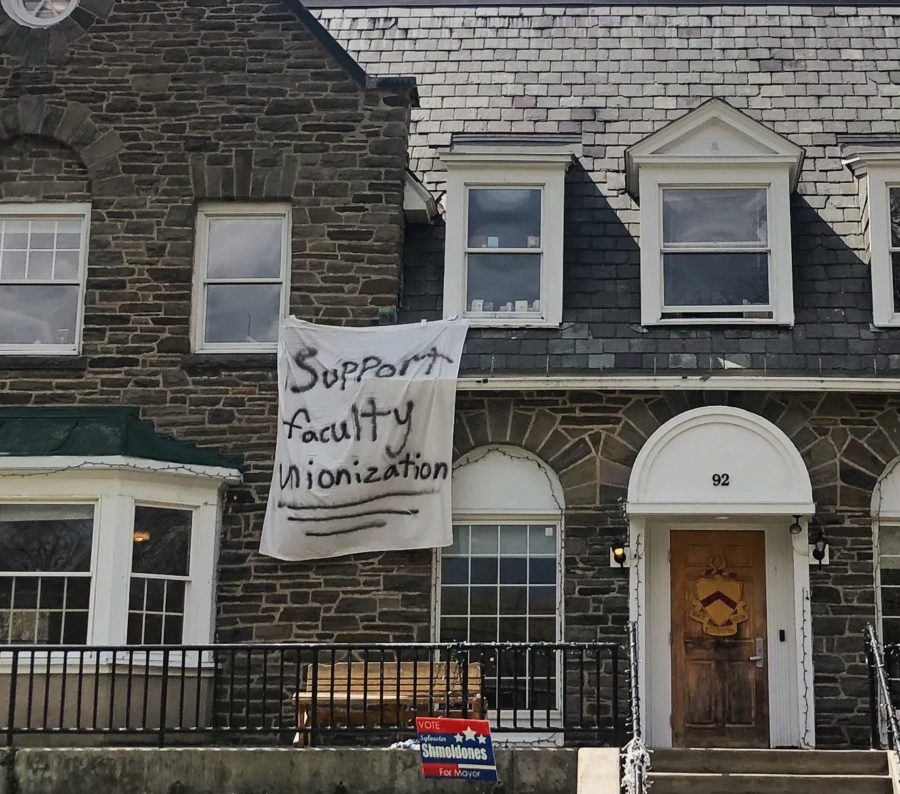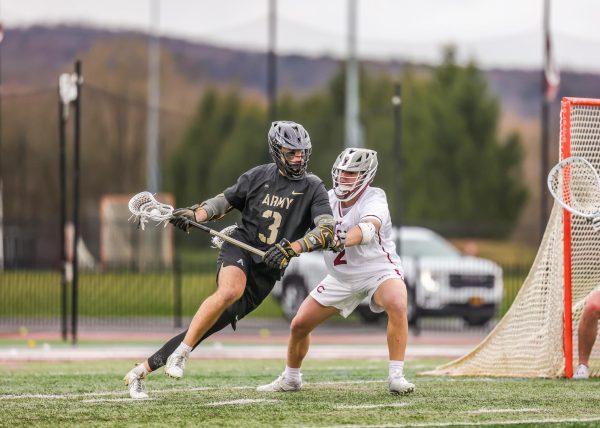Contingent Faculty Move Toward a Union
After over a year of organizing, all non-tenure-track contingent faculty are nearly ready to file a request for a union election with the National Labor Relations Board (NLRB); the Contingent Faculty Union Organizing Committee (Organizing Committee) has collected the majority of union authorization cards required to request an election, but is still working to bolster more community support.
The Organizing Committee began its efforts in Fall 2019 with a series of social events for contingent faculty to meet, identify their potential bargaining unit and discuss their diverse needs and how they would be addressed by the union.
“The motivations were then what they are still now. We are simply reaching out across campus to all contingent faculty with the interest of simply being able to join together,” Organizer and Cello Teacher Ruth Berry said.
The contingent faculty then successfully got the majority of the aspiring bargaining unit to sign union-authorization cards to indicate a desire to form a union. This particular bargaining unit would represent all adjunct faculty, junior and senior lecturers, instructors and visiting assistant professors, which organizers estimate is 100-150 people. Visiting Assistant Professor of Educational Studies and Union Organizer Laura Jaffee has been encouraged by the positive reaction to the organized social events.
“Of the conversations that we’ve had… there’s been overwhelming support, so that’s really encouraging to see and to hear that there is widespread support for a union. I think the general sense among contingent faculty is that this is something that’s really important to have a voice on campus and to have that legal right to sit down and negotiate with the administration over our working conditions,” Jaffee said.
Once a majority has signed their cards, the bargaining unit can move forward and petition the NLRB to conduct an election, which the contingent faculty has not yet done in the interest of bolstering more support and allowing for broad discussion. Once this petition has been made, the employer – Colgate University – will conduct an investigation of the bargaining union’s eligibility, and, should the bargaining unit prove to be eligible, the individuals in the bargaining unit will vote in an NLRB election to determine whether the union will be legally recognized.
The main priority for unionizing, Berry and Jaffee explained, is creating a transparent and legally protected space for all contingent faculty to discuss and negotiate their needs with each other and the University, covering topics like salaries, contracts, working conditions, benefits and job security. This is especially important given the precarious nature of most non-tenure-track faculty jobs.
“Without a union, there is no way for workers to have a legally protected right to negotiate things like our wages, our benefits, our job security and all these sorts of things that affect our lives. And it’s also a huge equity issue when we’re sort of siloed from each other, and we don’t have a structure in place where we communicate with one another, where we learn about, what are some issues that [we’re] facing and how might we address that in our contracts,” Jaffee said.
Berry sees non-tenure-track faculty isolation from one another as a big issue at Colgate. Both her parents were tenured professors at Colgate, so this isolation is particularly disappointing given that Berry knows what Colgate does for other faculty members.
“Compared to other higher education institutions where I have worked, I have noted that it seems that the tenure track faculty here have a much more regular sense of community, of communication across departments, and here I’ve felt very isolated. It’s like being in this little siloe,” Berry said. “Basically, unions are workers who come together, and we determine our own goals and we choose the rules by which we operate for the common good.”
There are already three existing bargaining units on Colgate’s campus, representing over 250 facilities, maintenance, housekeeping, food service, non-teaching library, mail services and technology workers. All three units are represented by Service Employees International Union (SEIU). Jaffee and Berry both said they are excited that using SEIU will encourage solidarity between contingent faculty and all these already unionized workers.
Furthermore, the contingent faculty unionizing efforts come during a national wave of similar union efforts in academia as universities rely more and more on non-tenure-track faculty, according to The Chronicle of Higher Education. SEIU also represents faculty on more than 60 college campuses, and Berry is looking forward to SEIU bringing Colgate’s contingent faculty into this broader community as well.
“We’re excited to work alongside the leaders of the other campus bargaining units. Colgate workers who are organized with SEIU have secured labor management committees and grievance procedures for ongoing problem solving, annual cost of living increases, 95% employer paid healthcare benefits for facilities and maintenance employees and more,” Berry said. “…We are greatly encouraged by the gains fellow faculty members have made at nearby colleges/universities as a result of their democratically choosing union representation.”
The Organizing Committee recently went public with their unionizing efforts in an April 2 letter to the editor, a strategic move that Berry and Jaffee said is important for bolstering support, educating the community about unions, including more contingent faculty and securing a fair election process.
The moment a unionizing effort becomes public, though, is also the moment when it can become more contentious. While Jaffee said she has no reason to believe that Colgate will do anything but uphold fair election processes, she also explained that it is generally in a university’s economic interest to work against unions with public campaigns to discredit the need for a union, which makes securing public support crucial at this stage.
Senior Advisor to the President Christopher Wells explained that the Administration has not yet become involved with the unionizing process.
“We’ve got great relationships with the existing unions on campus and [if] we get a formal request for another one we’d be happy to talk to folks about it,” Wells said.
An upcoming faculty vote that could grant contingent faculty certain voting rights has caused some concern amongst organizers about whether they will achieve a fair election process from the NLRB and Colgate Administration. Currently, most contingent faculty don’t have voting rights based on forty-year-old Faculty Handbook stipulations, which has been a particular point of focus this year as the faculty has been voting so frequently on the ongoing CORE revision. In other institutions’ attempts to unionize, such voting rights have been used to exclude contingent faculty from unionizing on the basis of them now having managerial power. As such, the Organizing Committee requested the faculty postpone voting on the matter when discussed in the April 5 and 16 faculty meetings, unless the University explicitly affirms they will not dismiss the union on this basis.
“It’s really just a matter of timing. We are completely in favor of contingent faculty having voting privileges, and voting privileges is something that is absolutely possible after we’ve achieved our union,” Berry said.
The community has shown immense support for the aspiring union. On April 15, 200+ individual students and 29 student organizations signed a letter to the editor that ran in the Maroon-News affirming their support for the union. The letter speaks to an understanding of the implications of contingent faculty working conditions on student life.
“With increased bargaining power and job security comes more academic freedom and an increased propensity to speak out against injustices both on Colgate’s campus and beyond, which helps us learn as students. We get a better education when our professors feel secure in their roles, and so we benefit when our contingent faculty have the right to democratically and collectively bargain the terms of their contracts,” the letter reads.
Professor of Religion Georgia Frank spoke to this dynamic from her perspective as a tenured faculty member, explaining that her ability to teach classes, conduct research and lead Sophomore Residential Seminars (SRS) would not be possible without quality instruction from non-tenure-track professors, who frequently fill in for tenured faculty. Frank signed a letter to the editor along with 15 other tenured faculty that ran in the Maroon-News on April 9, and said that her support for the union comes from an understanding of non-tenure-track faculty’s attention to students, often even after their contract with Colgate has ended, and an interest in better job security and livable wages for non-tenure-track faculty.
“It’s about being a part of a just institution,” Frank said.
Despite support for the mission of the Organizing Committee, some contingent faculty have taken issue with the tactics of the Organizing Committee, saying they haven’t allowed for robust discourse about potential complications, such as the vast diversity of non-tenure-track positions that would be represented in this bargaining unit.
University Studies Lecturer Ferdinand Von Muench, Senior Lecturer of Italian Franziska Merklin and Lecturer in Russian and Eurasian Studies Sergei Domashenko have expressed concerns about the Organizing Committee and SEIU’s approach to forming a union, which they say hasn’t allowed for open discussion about the union or potential alternative options. Von Muench believes this is partly due to the fact that contingent faculty don’t already have an existing space to debate such issues.
“What happens sometimes in these processes is that you have a very vocal campaign with big institutional backing — the SEIU is a big organization — and whoever has any questions or doubts basically will be very reticent about voicing those in public because they are worried about crossing their colleagues, or those institutions,” Von Muench said. “…My feeling is that the academic enterprise is all about having conversations and discussions about everything that is of importance. I don’t think it is a no-brainer that the SEIU is the right thing for Colgate… The union route might still be the best thing, but it’s still worth having the conversation.”
Being married to a tenure-track faculty member and working in one of the many academic programs with a less clear distinction between tenured and non-tenure-track faculty (e.g. a contingent faculty member chairing a department) also makes union conversations more complex for von Muench, and displays how Colgate doesn’t have as clear a divide and opposition between management and workers as other workplaces where unions exist. Merklin agreed that this complicated dynamic makes a union particularly deserving of sensitive treatment at Colgate.
Merklin and Domashenko, who is already involved in one of Colgate’s existing bargaining units with SEIU for his non-teaching role in the library, said that the lack of discourse has allowed for a disconnect between organizers and members of existing unions on campus who have had negative experiences with SEIU.
Berry and Jaffee recognized that some departments, like von Muench’s, are better at bringing non-tenure-track voices into conversations, but she is more interested in creating cross-department solidarity and discussion. They both said that COVID-19 has proven a significant barrier to large-scale discussion about the union, but has not negated the beginning of the formation of a strong union.
Emily Rahhal is a senior from Los Angeles, California double concentrating in Middle Eastern and Islamic Studies and Religion. She has previously worked...










Franziska Merklin, PhD, Senior Lecturer • May 7, 2021 at 9:42 am
Thank you, Emily, for writing about the unionization effort and for allowing us who felt steamrolled by the union pitch at the faculty meeting on April 5 or who are increasingly skeptical that unionizing will improve the situation of contingent faculty at Colgate to voice our opinion. I also want to thank Wanda for reminding us of the history of Category I positions and the many illustrious Colgate careers that began as contingent appointments. A reminder that seems most timely in the light of leadership appointments starting July 1 this year.
In my view, there are pressing questions that should be included in the debate about unionization and the situation of contingent faculty at Colgate: What options have been explored so far to have the interests of contingent faculty better represented than in the past? Is the union drive that is supported by SEIU Local 200 still pursuing the goal of “unanimity” as stated in the April 2 letter that was published in the Maroon-News? How is this union drive weighing the input from long-standing faculty members who have been at Colgate for 10+ years?
Working alongside Ruth, Laura and Chloe for some time I agree that there is an urgent need to advocate for the interests of contingent faculty at Colgate. I also praise every attempt at getting us contingent faculty in touch with each other. However, I regret the fact that colleagues who are eager to engage in conversations about possible ways to improve the situation of contingent faculty are dismissed once it becomes clear that they are doubtful of SEIU’s efficiency in representing their interests, and insist that it is worth pursuing alternative ways towards more inclusion and representation for contingent faculty. I am also disappointed at the lack of consultation regarding the union pitch at the faculty meeting on April 5. Did the apparently murky legal situation really justify speaking on behalf of colleagues without consulting with them first? My doubts have led me to revoke the union authorization card that I had signed last year. The work towards more inclusion and representation for contingent faculty continues, but for me as well as for others, it continues without the union.
One last note on departmental culture and respect that are difficult to legislate but crucial for the morale and wellbeing of colleagues: From conversations with many contingent faculty colleagues I have learned that unionization is often viewed not as a first or second choice but rather as the last resort to seek support in the face of departmental or program cultures that seem to be dominated by a binary distinction between tenure-stream faculty as the “real faculty” versus the “rest”. Yet we don’t have to look far to find models of inclusiveness that take into account the interconnectedness of all faculty and the varied and rich contributions that are so often made by contingent faculty: Wanda’s own Religion department could in many ways serve as a university-wide model for the successful inclusion of contingent faculty.
Wanda Warren Berry • May 2, 2021 at 2:38 pm
Ruth Berry refers to both of her parents as having been tenured members of the Colgate faculty. Perhaps the long history of Colgate’s development of policy regarding what are now called “contingent” appointments to the faculty can better be recorded if I note that I was tenured only after many years of my own persistence. Having been one of the first two women hired in 1962 to teach regular courses, I know that we were unusual not only because we were women teaching all male students, but because Colgate prided itself on not having part-time faculty.
By the late sixties, the number of such teachers at Colgate had grown, but it is notable that no women were able to vote in the faculty when coeducation was considered. In addition, like today’s contingent faculty, when we first began to talk with one another, we found great discrepancies in salaries, benefits, and rights from one department to another. We proposed and the Faculty Affairs Committee revised and brought forward a “part-time” policy that was far ahead of other institutions and allowed two Categories: Category I was a fully professional, but less than full-time appointment that included the right to vote in the Faculty. Category II was the usual Lecturer arrangement (which some preferred) and involved being hired only for a specific course.
Over the years this policy was refined, and it became possible for Category I faculty to stand for tenure. Please notice that tenure not only grants security, but it also is required to play certain roles in the college. Also note that because a Category I appointment was possible and later could become full-time, a good number of spouses stayed here and, in some cases, went on to important leadership roles: Dean/Provost , Acting President, Division Director, etc.
Wanda Warren Berry
Professor of Philosophy and Religion, emerita
Ferdinand von Muench • May 1, 2021 at 11:13 pm
Dear Emily,
Thank you for your article on the unionization drive!
I appreciate that you and the Maroon-News presented a variety of views on the issue: I see this as an example of the quality journalism that the Maroon-News stands for and that makes your paper such an important forum for reporting and hosting debates on the Colgate campus.
I have one quibble: the first sentence states that “After a year of organizing, all non-tenure track contingent faculty are nearly ready to file a request for a union election with the National Labor Relations Board […].” Where does that “all” come from from? I very much doubt that “all contingent faculty are nearly ready” to do this, and as the final part of the article itself demonstrates, some contingent faculty (including, but not limited to myself) are actually quite far (and in some cases increasingly far) from such an endorsement. I think it is important for the editors and readers of the Maroon-News to keep this in mind as the story—and your coverage of it—continues in the future.
Thank you again for all your good journalistic work on “hot button” issues at Colgate!
Ferdinand von Muench